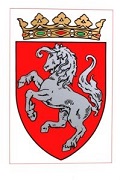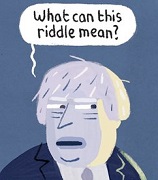|
Pluskut Tukker posted:Juncker is pissed at the European Parliament: I have always had far more confidence in the Commission than in the Parliament. The Commission always comes out looking like they are working with the interest of the EU at heart while Parliament (due to it's nature) seems like the place where member nations bicker and try to get ahead of each other.
|
|
|
|

|
| # ? May 28, 2024 20:11 |
|
MeLKoR posted:I have always had far more confidence in the Commission than in the Parliament. The Commission always comes out looking like they are working with the interest of the EU at heart while Parliament (due to it's nature) seems like the place where member nations bicker and try to get ahead of each other. I wanted to mention this during some recent EP discussion in the thread, but it seems like the worst assholes and eurosceptics end up as MEP. Farage, Le Pen, and I think that Dutch guy were all MEPs, and the first two had never even held elected office in their own countries beforehand. It just seems like a dumping ground.
|
|
|
|
The Dutch guy is an MP and was never a MEP actually.
|
|
|
|
Markovnikov posted:I wanted to mention this during some recent EP discussion in the thread, but it seems like the worst assholes and eurosceptics end up as MEP. Farage, Le Pen, and I think that Dutch guy were all MEPs, and the first two had never even held elected office in their own countries beforehand. It just seems like a dumping ground. European Parliament elections must be held under a system based on proportional-representation , unlike national elections. So where national election systems may keep out fringe candidates because they use FPTP or have a higher voting threshold, that's not possible in the EP elections. Also, because most people don't care all that much about the EP, voting for fringe/protest candidates appears like a consequence-free way to express your displeasure as a voter. And yes, political parties do not tend to send their best and brightest to the EP, since those would be of far more use in domestic politics. Going to Brussels/Strasbourg as an MEP in many countries is a good way to kill your political career (oc course, others might see it as a cushy sinecure).
|
|
|
|
Pluskut Tukker posted:Juncker is pissed at the European Parliament: Am I the only one that finds the optics of Juncker crying about a small and insignificant tax haven not being given respect hilarious? EDIT: I still also lack any kind of justification for why some representatives of the blocs being present wasn't considered enough beyond dick-waving. Does Juncker literally not know how parliaments function during non-vote sessions? MP's a free to determine on their own how to best use their time. MiddleOne fucked around with this message at 20:41 on Jul 4, 2017 |
|
|
|
forkboy84 posted:Yes, the alternative universe where before the second round comes the first round. Americans were hardly clamoring for people to vote Macron much in the first round, that all came in the second round. When it was just Macron and Le Pen because another say, 700,000 or so leftists couldn't be bothered to vote Melenchon to edge out Le Pen. Or hell, the regular old right wing couldn't be bothered to unite behind Fillon, to give him the extra 400,000 votes he'd need to edge out Le Pen for that matter. Sorry you're still mad because the French were too stupid to vote correctly in the first round, I guess? Ain't our fault.
|
|
|
|
Markovnikov posted:I wanted to mention this during some recent EP discussion in the thread, but it seems like the worst assholes and eurosceptics end up as MEP. Farage, Le Pen, and I think that Dutch guy were all MEPs, and the first two had never even held elected office in their own countries beforehand. It just seems like a dumping ground. The current head of the Finnish EU-sceptic party is a sitting MEP, but it remains to be seen whether he stays there or tries to come back to Finland. His dilemma is that he has no job here, so the MEP salary is probably attractive for a father of five.
|
|
|
|
Pluskut Tukker posted:European Parliament elections must be held under a system based on proportional-representation , unlike national elections. So where national election systems may keep out fringe candidates because they use FPTP or have a higher voting threshold, that's not possible in the EP elections. Also, because most people don't care all that much about the EP, voting for fringe/protest candidates appears like a consequence-free way to express your displeasure as a voter. And yes, political parties do not tend to send their best and brightest to the EP, since those would be of far more use in domestic politics. Going to Brussels/Strasbourg as an MEP in many countries is a good way to kill your political career (oc course, others might see it as a cushy sinecure). Yeah I guessed as much. So the EU ends up employing all the eurosceptic and racists, great system guys. In fact it looks like a sweet gig, maybe we should all run for it.
|
|
|
|
fishmech posted:Americans were hardly clamoring for people to vote Macron much in the first round, that all came in the second round.
|
|
|
|
R. Mute posted:Whenever reality doesn't suit fishmech... Reality has a liberal bias!
|
|
|
|
blowfish posted:Reality has a liberal bias! Liberal bias has its own reality?
|
|
|
|
MiddleOne posted:Am I the only one that finds the optics of Juncker crying about a small and insignificant tax haven not being given respect hilarious? I found his rage rather amusing too, but Juncker wasn't there to ask for respect for Malta being a tax haven, but to discuss the results of the Malta EU presidency. You would hope that MEPs might be interested in whatever progress comes out of the Council regardless of which country is holding the presidency. Is it also hilarious if nobody turned up for the review of Slovakia's presidency?
|
|
|
|
Pluskut Tukker posted:I found his rage rather amusing too, but Juncker wasn't there to ask for respect for Malta being a tax haven, but to discuss the results of the Malta EU presidency. You would hope that MEPs might be interested in whatever progress comes out of the Council regardless of which country is holding the presidency. Is it also hilarious if nobody turned up for the review of Slovakia's presidency? No, but I wouldn't exactly get up in arms about either. Again, anyone who expects full attendance to every parliamentary discussion is unfamiliar with how parliaments actually work.
|
|
|
|
MiddleOne posted:No, but I wouldn't exactly get up in arms about either. Again, anyone who expects full attendance to every parliamentary discussion is unfamiliar with how parliaments actually work. I think Juncker knows how parliaments work after working in them or with them for 33 years. If 5 % show up for a guest speech it is still insulting to the guest.
|
|
|
|
edit: Meant for German thread, nevermind
|
|
|
|
Decius posted:I think Juncker knows how parliaments work after working in them or with them for 33 years. If 5 % show up for a guest speech it is still insulting to the guest. It's really not. The MEP's who have genuine interest in knowing about Malta's run with the presidency are the few already present in the crowd. The European Parliament is a legislative body, it does not exist to massage ego's.
|
|
|
|
I think the more important part (though possibly not for Juncker) is dismissing representatives of smaller member states as unimportant, undermining the idea of the EU as a truly pan-European project.
|
|
|
|
Pluskut Tukker posted:Juncker is pissed at the European Parliament: I'm sorry but this simply isn't true and people should stop repeating it; if you ever want to see more/better democracy in Europe then the EP is your best bet so far. Unless we can move to the Glorious European Congress of Socialist States (I vote in favour). Since the Lisbon Treaty, the EP is the exact equal in lawmaking terms as is council. Both branches must agree on the legislative piece before it can be enacted. The reason why, especially in this Parliament, there seems to be so little is because it's a direct consequence and effect of Juncker's stated aim as head of the EC (the EC being the only one who can initiate new legislation). The EC is spending more time reviewing legislation and less time writing new stuff, which naturally gives Parliament less to do. However's that not something they did, or a lack of their responsibilities. Whether or not they use that power efficiently and wisely is quite another matter, of course. Pluskut Tukker posted:European Parliament elections must be held under a system based on proportional-representation , unlike national elections. So where national election systems may keep out fringe candidates because they use FPTP or have a higher voting threshold, that's not possible in the EP elections. Also, because most people don't care all that much about the EP, voting for fringe/protest candidates appears like a consequence-free way to express your displeasure as a voter. And yes, political parties do not tend to send their best and brightest to the EP, since those would be of far more use in domestic politics. Going to Brussels/Strasbourg as an MEP in many countries is a good way to kill your political career (oc course, others might see it as a cushy sinecure). There's also a lot of people who are actually quite good at their job there, prefer Brussels or are there for other reasons. There's also the fact that it's often advantageous for a party leader to send a rising star off to Brussels, where they'll be less of a threat and certainly less in the media. Same thing happens with EC Commissioners - some are sent there by rival parties in order to prevent them from running. MiddleOne posted:No, but I wouldn't exactly get up in arms about either. Again, anyone who expects full attendance to every parliamentary discussion is unfamiliar with how parliaments actually work. No, you really should get up in arms about it. MEPs get around 300e per diem for turning up in the Parliament in Strasbourg and voting. The per diem registration closes around noon, so the entire chamber was full after that because they'd all cashed their checks. Part of your duty as an MEP is to sit in chamber, review and ask questions about the previous Presidency; it's a function of democracy that they must fulfill, and are actually bonus paid to do so. It was ridiculous they weren't there, and Juncker was fully right to say that had Merkel been sitting there and not Muscat, the room would have been full.
|
|
|
|
Junior G-man posted:Since the Lisbon Treaty, the EP is the exact equal in lawmaking terms as is council. Both branches must agree on the legislative piece before it can be enacted. I agree with most of your post but I want to ask about this. As far as I understand them, articles 207(3) and 218 of the Lisbon treaty essentially open the door to the Comission and the Council to approve international agreements without asking the EP. And yes, 218(6) contains a list of circumstances in which they must ask the EP for consent. Also international treaties aren't legislation. But international treaties rank above legislation and become legislation once ratified. My understanding is that that's where CETA and TTIP are coming from, it's changing how the European Economy works without asking the EP. Am I wrong on thinking that? At the very least I would have interpreted 218(6)- (a)- iv as applying in the case of TTIP and CETA, but maybe I'm wrong on that one. Also I would say that, since the Comission and the Council have that attribution of sometimes changing how things go through international agreement then it's kinda incorrect to say that Parliament and Council have the exact same standing, right? I'm not trying to be pedantic, it is just one attribution, but there is a difference. Am I getting it wrong? Thanks for answering if you do  On a slightly different topic: That only the executive arm can introduce legislation is, in my opinion, utter bullshit.
|
|
|
|
Junior G-man posted:I'm sorry but this simply isn't true and people should stop repeating it; if you ever want to see more/better democracy in Europe then the EP is your best bet so far. Unless we can move to the Glorious European Congress of Socialist States (I vote in favour). I stand corrected on the first part (frankly I didn't think that part through when posting). For the second part I should clarify that I think there are plenty of good people in the Parliament, but it does seem to attract a somewhat higher percentage of idiots/profiteers than your average national parliament (thinking about people like Farage, Hannan, Eppink), but maybe I'm just more likely to notice them. Dawncloack posted:On a slightly different topic: That only the executive arm can introduce legislation is, in my opinion, utter bullshit. There probably is no other way which would be fair (which is one reason why my earlier post was wrong). The Commission is the only EU institution involved in lawmaking which is both supranational and where voting is not weighted. Since EU law tends to affect member states in asymmetric manner, getting the EP for instance to introduce legislation would mean the bigger member states with a higher number of MEPs could use their advantage in numbers to skew legislation in their favour. This is much harder to do when the initial proposal is as fair and impartial as possible. Pluskut Tukker fucked around with this message at 10:26 on Jul 5, 2017 |
|
|
|
Dawncloack posted:I agree with most of your post but I want to ask about this. I think there are indeed a number of circumstances where the EP can be excluded (I can't cite chapter and verse like you can), including international treaties. However, even CETA almost died on its arse due to the Walloons (of all people) throwing a legitimate fit. It was utterly hilarious here in Brussels to have some many people ask "what/where is Wallonia?!?". To be fair, I think most EU citizens can't find Wallonia on a map. Generally, however, your point stands and Council and Parliament aren't exactly 100% equal. However, in my defense I was talking more about passing EU-own legislation than about trade treaties and the like. I'm not so opposed to having the EC being the draft-writing institution though. In my experience, the EC is the far more reliable, pan-European thinking institution of the three; their remit and design is by far the most competent and European in outlook. There's a definite danger that giving parliament law-writing powers just creates an endless, endless traffic jam of nation-oriented pieces that clog up the process. Plus, like half the MEPs can't write an email without spelling errors, let alone craft complex legislation. I agree that it's a highly imperfect system, but like democracy, it's preferable to the alternatives. Pluskut Tukker posted:I stand corrected on the first part (frankly I din't think that part through when posting). For the second part I should clarify that I think there are plenty of good people in the Parliament, but it does seem to attract a somewhat higher percentage of idiots/profiteers than your average national parliament (thinking about people like Farage, Hannan, Eppink), but maybe I'm just more likely to notice them. Oh yeah, for sure there's a higher percentage of clowns and fools here. It's embarrassing beyond belief that we warehouse morons like Hannan, racists like Le Pen and plain human scum like Korwin Mikke. However, like in most places, the clowns with the loudest voices who are willing to say the stupidest things are the most likely to be featured on the front pages. The 2/3rd sensible majority doesn't get so much of a look in because what they do is much more boring than yell at Van Rompuy. Still, the percentage is too high. But that might also be an honest reflection of the composition of attitudes of Europe? (I hope not, but suspect so) Junior G-man fucked around with this message at 10:28 on Jul 5, 2017 |
|
|
|
Junior G-man posted:Still, the percentage is too high. But that might also be an honest reflection of the composition of attitudes of Europe? (I hope not, but suspect so)
|
|
|
|
Hambilderberglar posted:I think this ties into low turnout for EP elections across the bloc. People like Hannan, Korwin-Mikke and Farage aren't "competing" with "sensible" politicians for a vote, the way they would do in national elections. So the people who do turn out to vote for the EP would be cranks and loudmouths who aren't any more popular than normal, they just look that way because nobody else is doing much in the way of voting. Yeah that's probably true. I also think that most people use EP election to give their current national/regional government a kicking or send a message by picking the loudest people who (usually) stand in opposition to the government. They're being sensible in their own way, by sending signals to the national government, but the problem is that those signals actually get given flesh and form by the clown squad who resides here and fucks up the working of an efficient EP. In terms of practice, sometimes the Lisbon Treaty just creates loving mayhem, especially on the larger pieces of legislation. The last time we had a Common Agricultural Policy reform (2013), I think the total number of proposed amendments at the first reading was 8.647 or something close to it. It was loving madness as every MEP attached at least one or multiples to protect their own patch, bung some money to local wildlfowers or what have you. Even after the AGRI committee cooked it down to 200 substantial amendments it was just craziness. I watched the procedures for 2 hours and it was just 'vote for amendment 124, pertaining to blah blah blah' followed by tired hands going up or down, followed by gavel bang followed by followed by. Christ Almighty what a carcrash. It's also (partially, Council dicked around too) why everybody hates the current CAP; 10.000 million amendments and exemptions do a bad law make.
|
|
|
|
Pluskut Tukker posted:There probably is no other way which would be fair (which is one reason why my earlier post was wrong). The Commission is the only EU institution involved in lawmaking which is both supranational and where voting is not weighted. Since EU law tends to affect member states in asymmetric manner, getting the EP for instance to introduce legislation would mean the bigger member states with a higher number of MEPs could use their advantage in numbers to skew legislation in their favour. This is much harder to do when the initial proposal is as fair and impartial as possible. Junior G-man posted:I think there are indeed a number of circumstances where the EP can be excluded (I can't cite chapter and verse like you can), including international treaties. I have a question, though, on the whole Wallonia/CETA thing. Apparently, the fact that it was designated a mixed agreement, so all national parliaments had to ratify it, was a decision by Juncker (pushed, apparently, by French and German socialist MEPs) as a "gesture of goodwill". Does this mean that whenever it's a treaty that the Comission wants and some countries oppose, it will not be declared such and just approved via 207(3)/218? Seems like Wallonia holding that up was due to happenstance and when TTIP 2 comes around (not that it's needed, CETA is already approved) they will simply not issue that gesture of goodwill. So I appreciate your argument but I am not sure it's solid, it seems to me that the power to pass any kind of horrible legislation through international agreement is effectively there. Dawncloack fucked around with this message at 11:14 on Jul 5, 2017 |
|
|
|
Dawncloack posted:Does this mean that whenever it's a treaty that the Comission wants and some countries oppose, it will not be declared such and just approved via 207(3)/218? Hopefully I am not wrong on any of this and Junior G Man doesn't yell at me.
|
|
|
|
Dawncloack posted:Ah thanks to both, you make a good point, I hadn't considered that, if parliament could introduce legislation, the voices of smaller countries would be overwhelmingly drowned. In retrospect that was a glaring blind spot on my part. I'm not a trade expert, but happy to chat about them anyway. Working in Brussels does that to you  Yeah, the CETA thing was essentially a sop to democracy (horrid phrase, horrid thinking behind it); the EC and Council saw that everybody was hating hard on trade treaties and so decided to allow national/regional governments the power of ratification. It did lead to some extraordinary scenes where Martin Schultz was personally in the offices of his nominal S&D comrades from Wallonia begging them to vote in favour. It was, especially for S&D, a disgrace. In terms of trade treaties, the EC is the only competent authority to negotiate trade deals for the EC27/28. You can see why; if you have a common market and customs union, you can't have 28 MS setting up separate trade deals. It would lead to chaos, gameplaying and an ever sharper race to the bottom. I believe that Council does have to approve trade agreements, but even there there are some exemptions. The Wallonia Event was essentially a happenstance if you're looking at it purely legally, but politically it's a different matter. There was and is huge (and in my opinion well-founded) opposition to TTIP, and the EC are no longer as politically tone-deaf as they used to be. Plus CETA has set an almighty precedent, and it would be very difficult to not offer ratification again. The power, as you say, is there, but wielding it is quite another matter. Hambilderberglar posted:External trade is an exclusive EU policy, and has been for quite some time. Juncker's decision to designate it a mixed agreement has no relationship to anything in the treaty content. There just was the sense of not wanting it to be perceived as something Brussels all rammed down our throats. If it failed, he/Brussels dodges a bullet, if it succeeds, all the people against it can't yell about perfidy in Brussels undermining national sovereignty. Exactly right even 
|
|
|
|
https://www.youtube.com/watch?v=gEY47cabUjk German tourists are now trendsetter
|
|
|
|
|
Dude, everyone already knows about the rise of Fascism.
|
|
|
|
gently caress this garbage
|
|
|
|
https://twitter.com/Max_Fisher/status/882635219429457921quote:German financing and basing for the program would be intended to demonstrate its function as a guarantor of European security. Officials in Poland, an informal security leader among Eastern European states, have expressed support in public comments.
|
|
|
|
quote:European parliament votes to suspend Turkey EU accession talks article
|
|
|
|
Kassad posted:lol Nuke plants? Nope, we don't want that poo poo. Oh rockets? Yeah, sure, why not! 
good.
|
|
|
|
https://twitter.com/Wahlrecht_de/status/883001551870201856 This is what a stable political system looks like. <3 Germany
|
|
|
|
|
You mean, a permanent conservative majority and left parties that will never win control of government because they hate each other too much? Also, in other words Japan icantfindaname fucked around with this message at 20:42 on Jul 6, 2017 |
|
|
|
At least the Japanese political class renews itself somewhat when everybody and their mum periodically resigns because of a corruption scandal.
|
|
|
|
Ah yes, this never heard of phenomenon where the politics of an imperial center are always more conservative.
|
|
|
|
I know nothing about German politics. Why did Schulz-mentum stall so dramatically?
|
|
|
Edible Hat posted:I know nothing about German politics. Why did Schulz-mentum stall so dramatically? Because he is a populist shitler who doesn't even support the Nato treaty fully.
|
|
|
|
|
Edible Hat posted:I know nothing about German politics. Why did Schulz-mentum stall so dramatically? He tried to be German!Corbyn before it was cool and the Schulztrain got rolling. Then it turned out he's a boring centrist barely distinguishable from Gabriel besides being less bad at public speaking, and unlike Macron he's still not good enough at speeches to hide the fact that he's a mediocre poo poo who is radically pro business as usual.
|
|
|
|

|
| # ? May 28, 2024 20:11 |
|
Germany's current account surplus is bad for the world, says The Economist:quote:Germany saves too much and spends too little. And the size and persistence of Germany’s savings hoard makes it an awkward defender of free trade. At bottom, a trade surplus is an excess of national saving over domestic investment. In Germany’s case, this is not the result of a mercantilist government policy, as some foreigners complain. Nor, as German officials often insist, does it reflect the urgent need for an ageing society to save more. The rate of household saving has been stable, if high, for years; the increase in national saving has come from firms and the government.Underlying Germany’s surplus is a decades-old accord between business and unions in favour of wage restraint to keep export industries competitive (see article). Such moderation served Germany’s export-led economy well through its postwar recovery and beyond. It is an instinct that helps explain Germany’s transformation since the late 1990s from Europe’s sick man to today’s muscle-bound champion.
|
|
|














 I CANNOT EJACULATE WITHOUT SEEING NATIVE AMERICANS BRUTALISED!
I CANNOT EJACULATE WITHOUT SEEING NATIVE AMERICANS BRUTALISED!









